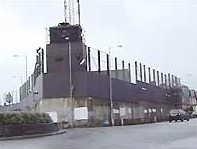
The North’s Policing Board has agreed to sell off underused and abandoned PSNI stations in towns and villages across the Six Counties.
While Unionist members opposed 20 of the 26 closures, they were outvoted on each occasion by nationalist and independent members.
Of the 26 stations, 20 already are effectively closed. Five have limited opening, which means they open occasionally, while only one, Bessbrook in County Armagh, is fully operational.
The cost of defending small, isolated PSNI stations against potential attack by republican armed groups is understood to have been a major factor in the decision.
The proposals are part of a plan that could see more than 40 of the North’s 108 PSNI stations shut down by 2012.
PSNI chief Hugh Orde admitted many of the abandoned bases had fallen into disrepair. He is seeking to raise seven million pounds from the sales.
Some unionist politicians claimed that the closures could make it easier for dissident republicans to operate while Sinn Fein has insisted that the closures are necessary and pragmatic.
SDLP Policing Board member Dolores Kelly supported the decision saying stations should not be kept open “just because the sight of them is comforting to some in our community”.
Sinn Fein’s Alex Maskey said that none of the stations were “serving any useful purpose in respect of delivery of a proper police service”.
However, a statement from the DUP members of the Policing Board said the decision had allowed “front-line policing to be a casualty of budgetary shortfalls”.
Meanwhile, it has been revealed that the PSNI spent three hundred thousand pounds on informers last year.
Sinn Fein Policing Board member Daithi McKay MLA said he was concerned that “too much focus” was being placed on recruiting so-called ‘touts’.
“Obviously we all know the stories about informers in the north before and their agendas. It is not the way we want to go forward in terms of community policing.
“We do not need policing based on paying people off to inform on communities and gather intelligence on communities.”
![[Irish Republican News]](https://republican-news.org/graphics/title_gifs/rn.gif)
![[Irish Republican News]](https://republican-news.org/graphics/title_gifs/harp.gif)

